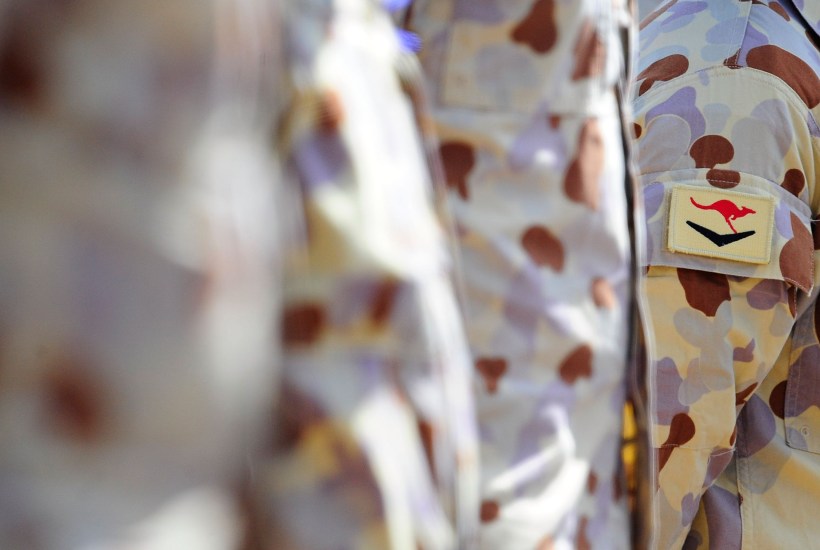Thousands of Australian military personnel who served in Iraq and Afghanistan are at risk of being dragged through the courts for years on the word of people who were suspected insurgents unless legislation is put in place urgently to protect them. This is the view of a number of informed lawyers who spoke to me, and who are alarmed at the prospect of service men and women being subject to civil lawsuits arising from these conflicts.
Two-star ranked officers also told me said they were concerned at the prospect of such lawsuits. One said his understanding was that our personnel were in fact, “totally exposed.”
Some 26,000 personnel have deployed to Afghanistan since 2001, and a further 20,000 to Iraq. At risk are all those who were in combat units, or who were had contact with detainees, or were involved in security operations in those countries. This amounts to many thousands of Australian men and women.
This is because the current Brereton Inquiry runs the risk of ventilating grievances that could ultimately result in civil claims in the same way the Iraq Historic Abuse Team (IHAT) inquiry did in Britain.
In May this year, one UK law firm alone lodged 250 claims for damages from Iraqi civilians alleging their human rights had been violated by British troops in the war zone. The firm has indicated it may bring another 200 additional claims.
Part of the problem is the extraordinary latitude given to Iraqis making claims of abuse.
Major Robert Campbell, a British Army bomb disposal expert, was advised this year he would be investigated for the eighth time over the death of an Iraqi teenager in 2003. This is in spite of first being cleared in 2006 and subsequently decorated for his exemplary service.
Another former British Army officer who commanded troops in Iraq and now lives in Australia, Major G, told me of the trauma unleashed on former soldiers as a result of these cases.
“I have seen the devastating effects of needless investigation on officers who carried out difficult tasks to high standards in very difficult conditions. These investigations went on for years before people were finally exonerated,” he said.
“That exoneration is pathetic compensation for the anxiety, self-doubt, personal loss of time, and the damage to career progression and personal relationships the process has cost the individuals in question. It is a disgrace.”
One military lawyer here told me there was no statutory bar to the same thing happening in Australia. In fact, he said, he would need to go back to a 1940s shipping case to try to find protection from claims for military personnel, but even then it was not decisive.
Since then, Manus Island asylum seekers received $70 million in compensation last year from the Australian government for the supposed psychological harm they received while in detention. Their claims included finding hair in their food; having to queue for hours for meals, and having to ask for toilet paper on a case-by-case basis. Heaven knows what the courts would make of claims from Iraqi or Afghan detainees.
Service personnel who commit crimes are already subject to military criminal proceedings, and this is rightly so. However, exposing them to claims for personal injury claims would be perverse and entirely unjust.
In many cases, service personnel may not be able to properly defend themselves because details of their operations, or the intelligence they used, are secret and cannot be disclosed. In the case of claims brought by detainees, there might be very good grounds to hold a person in detention, but these cannot be revealed because they come from classified sources. Disclosing this information in court would put the lives of these sources at risk, and insurgents know it.
Another problem is that civil liability claims do not have to be proven “beyond reasonable doubt” as criminal charges do, but only to the lower standard of the “balance of probabilities.” These judgments will be made many years later by judges in Australia who have no idea what it is like to serve in a combat zone.
As Major G is at pains to point out: “There are very few lawyers or politicians in modern society who have insight into the incredible stress imposed on people in a military conflict.
“They do not understand what strength of character is needed to just continue to function when sleep deprived, stinking from the absence of running water and basic hygiene, and stretched intellectually in every direction in the fast-moving environment that is modern warfare.”
He is entirely correct. The very idea that highly paid lawyers in comfortable courts in Australia can understand, let alone litigate these cases, is fanciful at best. At worst, it is a self-delusional conceit.
How absurd it would be for our service men and women to be subjected to damages claims in these circumstances, let alone be asked to find the money for legal costs and a possible damages order against them. This is not something people agree to when they sign up to serve our country, nor should it be.
Moreover, even if the claims were rejected, decent men and women in uniform would face the prospect of spending years before their courts, and seeing their lives destroyed, before they could ultimately be vindicated. Those who put on a uniform for our country deserve better than this.
All of these factors demand the Australian Parliament legislate to give our service men and women statutory protection from such claims.
There is only one reason why our service personnel find themselves in war zones, and that is because their political masters have directed them to be there, and to use lethal force to achieve political objectives. Everything that follows starts with this simple proposition.
We expect those at the pointy end of the spear to close with the enemy and to capture or kill him, by day or by night, in all manner of circumstances. Asking them to also consider possible civil liability in a court in Australia many years afterwards cannot be part of that task.
Most Australians live relatively privileged lives, and few more so than politicians and lawyers. That is only possible because a handful of our countrymen lay aside their privileges to don a uniform and risk their lives in filth and heat and dust, and sometimes die there. They do this to protect our way of life. It is only fair to expect Parliament to find the courage to give them some modicum of protection in return.
Bill O’Chee is a former senator and a former officer in the Australian Army.
Got something to add? Join the discussion and comment below.
Got something to add? Join the discussion and comment below.
Get 10 issues for just $10
Subscribe to The Spectator Australia today for the next 10 magazine issues, plus full online access, for just $10.


























Comments
Don't miss out
Join the conversation with other Spectator Australia readers. Subscribe to leave a comment.
SUBSCRIBEAlready a subscriber? Log in